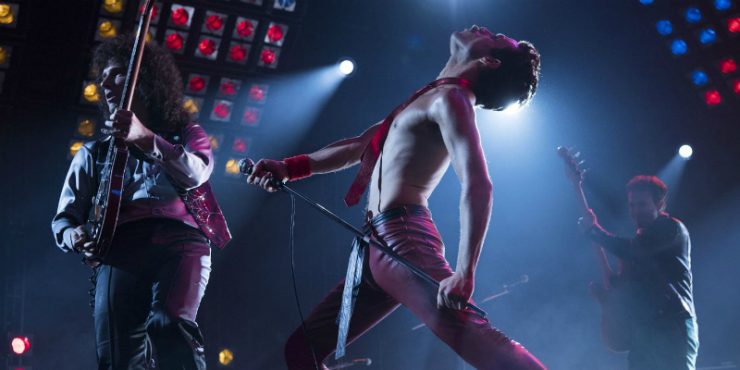I think one day we will get a documentary about the making Bohemian Rhapsody, a film that took nearly a decade to get made, went through a carousel of leading men and directors, was constantly pushed back and forth in terms of creative direction. That is a story of incredible drama, filled with betrayal, disappointment and intrigue. What we end up with here is an essentially run-of-the-mill biopic, a rise-and-fall-and-rise-again rockstar tale that features nearly all of the hits we know from the titanically successful band, Queen. The film’s main focus is on Queen’s enigmatic front man, Freddie Mercury, a larger-than-life performer with famously bombastic vocal range who died at age 42 after contracting the AIDS virus.
Mercury is played by Rami Malek, a young idiosyncratic actor known mostly for the television show, Mr. Robot, but known to me for his small, quirky parts in indie films like Short Term 12 and The Master. Malek trends towards careful, soft-spoken characters that function best outside of the spotlight – in other words, the complete opposite of Mercury. Malek rises to the occasion for Bohemian Rhapsody, infusing his Mercury with vanity, megalomania and copious amounts of flair. Actors portraying real people often get “transformation” credit for the work that make-up artists and costumers do, but Malek’s performance is incredibly physical, encompassing the stage antics and vocal pyrotechnics that were so essential to Mercury’s persona (though Malek didn’t do much of his own singing).
For the rest of Bohemian Rhapsody – named after the band’s iconic single from 1975 – things go as matter of course. Born Farrokh Bulsara, Mercury comes from a strict home, the parents of Indian Parsi immigrants. He spends nearly all of his nights frequenting rock clubs. When one of his favorite bands loses their lead singer, he volunteers himself as a replacement. Changing his name and altering his style, Mercury takes the stage and enraptures the audience with his otherworldly energy. He also captures the attention of Mary Austin (Lucy Boynton), a salesgirl who becomes Mercury’s girlfriend, and eventually his wife. Those familiar with Mercury’s closeted homosexuality will understand right away where that narrative strand is headed.
We know most of the story: Queen becomes one of the biggest rock acts in the world, behind anthemic hits like “Somebody to Love” and “We Are The Champions”. The film’s script (an amalgamation between Peter Morgan’s original draft and Anthony McCarten’s finished product) makes egalitarian attempts to track the behaviors of the other members of Queen (Gwilym Lee is Brian May, Ben Hardy is Roger Taylor, Joseph Mazzello is John Deacon), and their byzantine structures for awarding songwriting credit and royalty payments. These moments feel like holdovers from guitarist Brian May’s original intention to make a film about Queen, instead of just about Mercury. In the end, Bohemian Rhapsody is a film mostly about Mercury, and the various ways he flourished or felt stifled within the framework of Queen.
As for Mercury’s sexuality, the film has already gotten much blowback for its depiction the legendary singer’s connection to the queer community; and it can be said that it does an incredibly poor job of avoiding connections between Mercury’s indulgences in 70s-80s gay culture and his eventual descent into alcoholism and empty decadence – and his contraction of AIDS. This comes mostly in the form of the character of Paul Prenter (Allen Leech), a band manager who becomes Mercury’s personal assistant and occasional lover. Prenter eventually becomes a leech on Mercury’s time, money and professional opportunities, steering his life into a sex-mad spectacle that alienates the rest of the band. I wouldn’t call Bohemian Rhapsody homophobic, but I would also stop short of calling it a truly honest, vulnerable portrayal of sexual exploration.
It’s hard to know who to credit (or blame, depending on your take) for Bohemian Rhapsody, since Bryan Singer – fired from the production after a levee of sexual misconduct accusations and an altercation with Malek – gets the final credit despite a good chunk of the work having been done by director Dexter Fletcher. The handling of this goes hand-in-hand with the production’s troubles before cameras even started rolling, which probably explains why the film ends up where it is: nowhere near as unique as the very performers it profiles. But Bohemian Rhapsody does have the benefit of having Queen’s music playing throughout, and a lot of their most famous numbers have the drama and grandeur of a melodrama. Add Malek’s wonderfully inspired performance to the excellent soundtrack, and this should be great fun for those not expecting much more.
Directed by Bryan Singer










